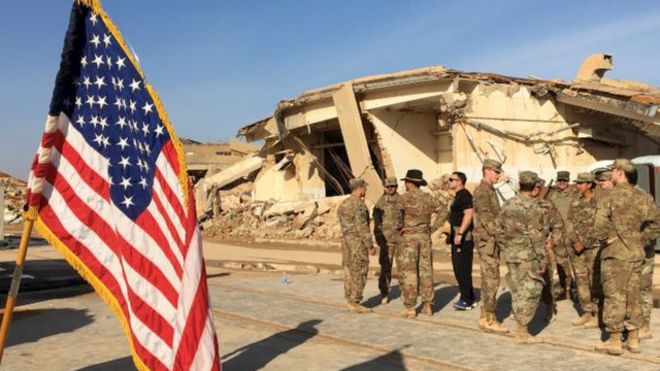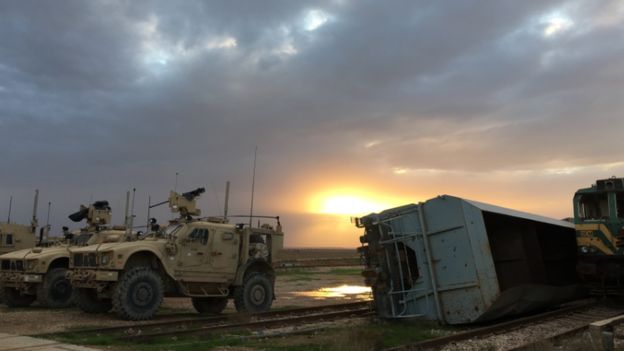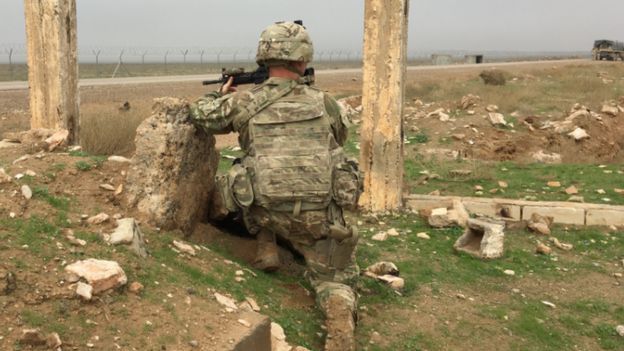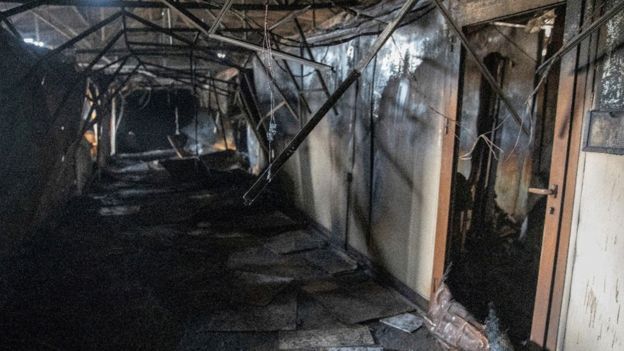
In the coming weeks, the American army will withdraw from the Al-Qaim base, in addition to two other military bases in Iraq.
The decision to withdraw from 3 of the 8 bases in Iraq indicates that the United States is looking to reduce its presence significantly in the country.
This comes amid increasing tensions with the Iraqi government and Iran.
A ceremony will be held this week in Al-Qaim, as the United States will officially hand over equipment to the Iraqi army to help it ensure security in the area.
Therefore, any American presence along the Iraqi side of the border with Syria will end.
The base was built on the ruins of the oldest train station in Iraq, near a small town of the same name along the Euphrates.
The region was the first place in Iraq in the hands of the Islamic State “ISIS” in 2014, and the last area to be recovered by Iraqi forces in November 2017.

After the victory over the Islamic State in the region, the Iranian-backed militia took control of both sides of the border.
Although the Iraqi security forces were also present in the vicinity of al-Qaim, they are now under the control of one of these militias, the Popular Mobilization Forces.
I have traveled to Qaim with US forces twice in the past two years, and have witnessed how the atmosphere around Al Qaeda gradually changed.
In December 2017, both Iraqi and American flags could be seen fluttering as the US-led coalition and Iraqi forces worked together to fight ISIS.
Corona Virus Spread Map and numbers of infections and deaths around the world
At that time, groups in the PMF, especially the Hezbollah brigades and the Tawaaf brigades, both closely linked to the Iranian Islamic Revolutionary Guard Corps, were fighting ISIS on both sides of the border.
The situation was not comfortable on both sides, but they had a common enemy working to defeat him. The Iraqi army was a mediator, and often coordinated operations against ISIS.
“We will make them leave”
But during my last trip in December 2018, the mood in the area changed dramatically. Iranian-backed groups have become part of the official Iraqi security forces and are gaining power.
That year there was only one flag flying across Qaim, and the Americans took control of Al Qaeda. But outside the base, the roads were full of crowd flags and billboards depicting Iran’s supreme leader, a man some crowd groups see as their religious leader and leader.
American convoys had to pass through the PMF-controlled checkpoints to travel to its artillery base on the Syrian border.
But the PMF began to demonstrate its opposition to the presence of US forces in Iraq, saying that it was able to deal with any threat from ISIS alone. The Hezbollah Brigades has accused the United States of attacking its bases near the Syrian border, something that the Washington-led coalition has repeatedly denied.
“We will make them leave if they do not want to leave,” said the commander of the Hezbollah Brigades, who called himself “Abu Amin” in an interview at the Popular Mobilization headquarters in Baghdad.
The US assassination of Iranian General Qassim Soleimani in Iraq earlier this year destabilized that fragile dynamic.

General Soleimani, the commander of the elite force of the Iranian Revolutionary Guards, was killed on January 3 in a US drone attack near Baghdad airport, alongside Abu Mahdi al-Muhandis, deputy commander of the Iraqi Popular Mobilization Forces. This led to a vote in the Iraqi parliament to expel all foreign forces, especially Americans, from the country.
US officials say they have been planning to leave areas like Qaim since last year due to the reduced threat from the Islamic State, but concerns over the safety of US and coalition forces have accelerated the move.
A wave of attacks
A senior US Defense Department official told BBC that the Hezbollah battalions’ proximity to al-Qaeda was “a major factor in calculating the decision to move forces elsewhere.”
The United States is also planning to withdraw from Qayyara Airport, known as “Qwest”, and Kirkuk.
Qayyarah was used in the US-backed operation to retake Mosul from the Islamic State. The two bases have been rocketed in recent months. A US contractor was killed in a missile attack on Kirkuk on December 28.
Hizbullah Brigades blamed, and American air strikes followed, against the group’s headquarters in Syria and Iraq, killing 25 people.
 Image sourceUS CENTRAL COMMAND
Image sourceUS CENTRAL COMMANDAt least 25 missile strikes, which have unleashed more than 160 missiles, have hit US bases in Iraq since October 2019.
Last week, two attacks on the Taji base killed three members of the coalition, and seriously wounded two members of the Iraqi security forces.
However, the US retaliatory attack on sites that the Americans say are storage facilities for Hezbollah munition ammunition, has killed three Iraqi army personnel, two local police officers and one civilian.
The attacks strained the relationship between the Americans in Iraq and the country’s army, and their hosts and Native Partners in the fight against the Islamic State.
In an unusual step, the Iraqi Joint Operations Command, the control center for all military activities in Iraq, issued a statement blaming both sides, but supported the parliament’s vote to ask the Americans to leave.
The official number of US forces in Iraq has been estimated at 5,200. It is not clear how many troops will be redeployed after the three bases are closed, as some of them will be moved to other bases of operations inside the country.
The future of these remaining forces is not guaranteed. The United States hopes that its relationship with the Iraqi security forces will not have ended yet, but many in Iraq believe that America has remained too much.